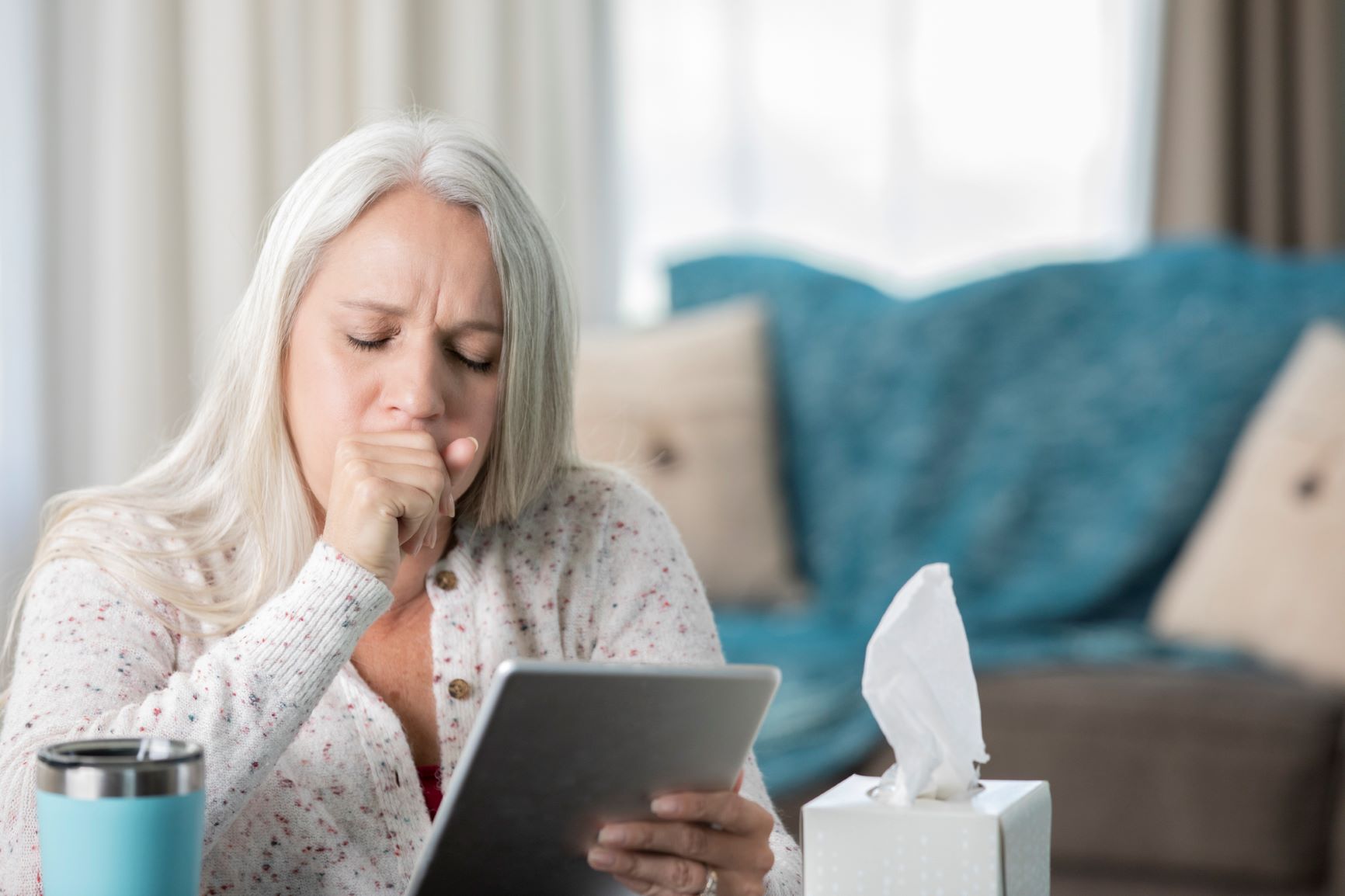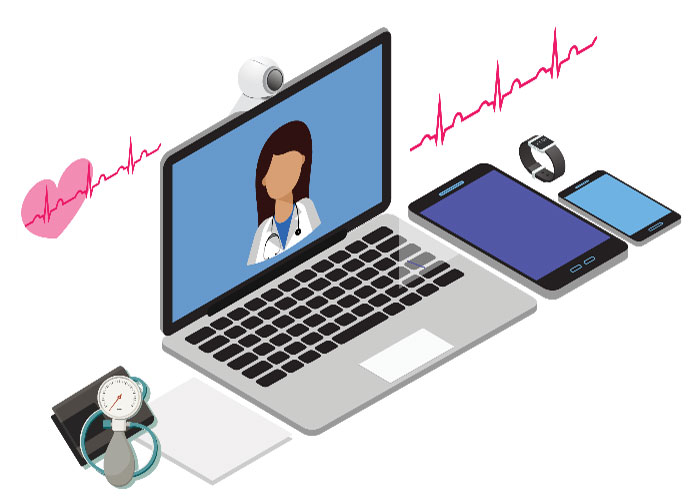
Our telemedicine program helps current patients follow up with their Johns Hopkins health care provider using a smartphone, tablet or laptop with webcam. It’s an easy way to consult with your health care provider while reducing wait times and avoiding the hassle of getting to the doctor’s office.
“The use of telemedicine has facilitated psychiatric visits for patients who had previously gone months before they could coordinate a way to come to the clinic. The ability to see my patients more often is always a good thing.”
— Hal Kronsberg, M.D., participating psychiatrist
A Safe and Secure Platform
The telemedicine program at Johns Hopkins is wholly owned and operated by Johns Hopkins Medicine. Through the system, your health care provider has access to your secure electronic medical records.
Your information and safety are carefully protected when you use telehealth services, just as they would be in an in-person health care provider visit. Each transmission is secure and compliant with all traditional privacy regulations.
How to Connect
- Your current health care provider may accept virtual appointments so check with the office. If you’re a new patient, review the specialties covered or, when you make your first appointment, ask if a health care provider who accepts online visits is available.
- Make an appointment and request a virtual visit.
- Adult - Maryland residents: 410-955-5000
- Pediatric - Maryland residents: 443-997-5437
- Outside of Maryland
- 410-464-6555 (US citizens)
- +1-410-502-7683 (non-US citizens)
- Set up your MyChart account.
- Test your device(s) to make sure it is set up properly.
- For more help, call the Video Network Operations Center (VNOC) Hotline: 667-208-6100, available Monday through Friday, 8:30 a.m. to 5:00 p.m., EST.
Tools You’ll Need

Your doctor will let you know which of these tools you’ll need for your telehealth visit.
- MyChart app
- Smartphone, tablet or laptop with webcam
- Oxygen stat monitor*
- Bluetooth scale*
- Blood pressure cuff*
*These are specially ordered tools for patients if needed to conduct telemedicine visits with specific specialties.
Participating Health Care Providers and Programs
The following health care providers and specialty areas are taking part in Johns Hopkins Medicine’s telehealth services.
-
As ALS patients become progressively debilitated, their ability to travel becomes limited. This makes it difficult for patients to follow up with their specialist and access our ALS clinic.
Real-time video visits may be an ideal alternative for critically ill patients with ALS, allowing them to remain at home while they receive care. Through this program, we’re also studying the feasibility of telemedicine care for established patients with ALS compared with standard in-person care.
To make a telemedicine appointment, please call 410-614-9874.*for Maryland residents only
-
Patients with cardiac disease that may stem from an underlying genetic cause can schedule, consent, and pay for services online. The cardiology genetic counseling team plans to provide telemedicine services for patients.
-
After completing a medical history questionnaire, new patients interested in weight-loss surgery can consult with Johns Hopkins expert Michael Schweitzer, M.D., through the Johns Hopkins Community Physicians office in Hagerstown.
-
Child and adolescent psychiatry Medicaid patients at Johns Hopkins Bayview Medical Center who get therapist visits can use telemedicine for their follow-ups or get help with urgent matters from Hal Kronsberg, M.D.
-
Certified nursing assistants in the emergency departments at The Johns Hopkins Hospital, Howard County General Hospital and Johns Hopkins Bayview Medical Center are using telemedicine technologies to screen patients while communicating with a doctor in a remote location to reduce wait times and begin treating patients more quickly.
-
Existing patients of the Headache Center have access to telemedicine appointments, putting them in touch with a provider to initiate a treatment plan for acute headache flares.
-
The Johns Hopkins Home Care Group is using telehealth technology to work with Johns Hopkins Community Physicians. Together, the two groups are improving care for home-bound patients by advancing the ability to capture real-time vital signs and engage with patients through video.
-
Patients can schedule video visits if their provider is listed as their primary care physician in Epic, and they have had an in-person appointment in the last 18 months.
-
As part of a clinical trial, current patients of pediatric endocrinologist Risa Wolf, M.D., can get their regular screenings for retinopathy using telemedicine. The exam does not require eye dilation. The patient’s physician conducts the screening then sends the results to the Wilmer Eye Institute for review.
-
Pediatric pulmonology, nephrology and endocrinology patients who live on the Eastern Shore can connect with their Johns Hopkins specialists virtually from the Talbot County Health Department. A nurse at the health department connects the patient to their Johns Hopkins specialist and can provide a physical examination, if necessary. The purpose of the program is to increase ease of access for these patients. The patient or caregiver should contact their specialist’s office in order to request this type of visit.
Read more about Pediatrics at Talbot.
-
Patients getting treatment at the Sleep Disorders Center at Johns Hopkins Bayview Medical Center and Howard County General Hospital can use telehealth services for routine follow-up appointments.
-
In treating stroke, timely administration of clot-dissolving drugs and other treatments is essential. Telestroke uses video consultation and examination of patients suspected of having stroke, backed by the expertise of Johns Hopkins stroke expert Victor Urrutia, M.D.
-
The Acquired Brain Injury Clinic within the Johns Hopkins Bayview Community Psychiatry Program uses telemedicine visits to increase access to the neuropsychiatrist and provide patients with an alternative to visiting the clinic in person. The visits are performed with the patient in the clinic (when seeing the therapist) and the neuropsychiatrist participating remotely. The telemedicine option saves patients from having to return a second time to see the neuropsychiatrist, and access is increased in cases of emergency.